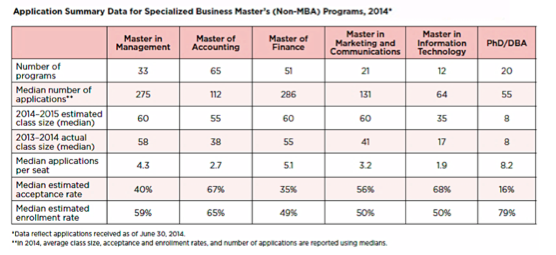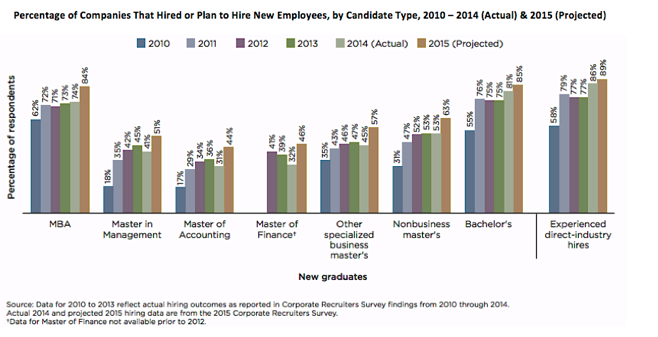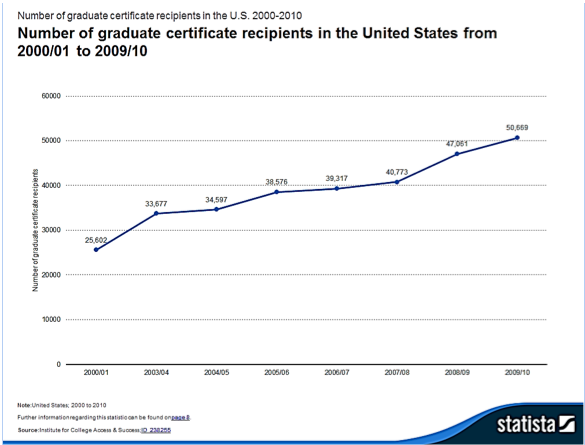Earning an MBA can be a wonderful and effective way to advance one’s career – but it isn’t the right choice for everybody. In fact, there are several educational alternatives to an MBA that may be a better fit for you and your career goals. In this blog, we’ll explore a few of these alternatives, and put them in the context of relevant industry trends
Enroll in a Master’s Program
Before enrolling in a master’s program, it is important to understand the differences between traditional MBA programs and master’s programs in business. While the general approach in a traditional MBA program is to equip a student with the knowledge to deal with a wide variety of business-related situations, a master’s program allows students to specialize in specific fields, as well as obtain a more theoretical, academic education.
In a study conducted by the Graduate Management Admission Council, a record number (259) of specialized non-MBA business master’s programs received more than 64,000 applications for the 2014-2015 school year. These specialized masters include, but are not limited to: finance, management, marketing, economics, accounting, health administration, communication, and real estate. Students may find these specialized studies to be more in line with their interests in the business field.
Employers are interested in these specialized master’s programs as well. According to GMAC’s 2015 Corporate Recruiter’s Survey Report, the proportion of companies planning to hire recent graduates of master’s programs in accounting, finance, and management is also expected to rise this year compared with 2014.
Deciding on whether an MBA or a master’s degree is right for you depends entirely on your intended career. If you are thinking of pursing a general management position, then an MBA may be the better choice. An MBA allows exposure to every major business function, which offers enough depth to deal with specialists in the field and also provides the breadth necessary for graduates to oversee multiple departments. If you want your career to focus on one discipline, you may want to consider a specialized master’s instead.
Exploring Mini-MBA Programs
According to Bloomberg Business, the downturn in the economy has pushed people to look for fast and inexpensive ways to build their business skills and bolster their credentials. Additionally, commitment to work, family, or other factors may also make pursuing an MBA unrealistic. Mini-MBA programs are a great option for those who want a structured learning environment, but cannot commit to the time and monetary investment of a full MBA.
A Mini-MBA program is a term used by many non-profit and for-profit institutions to describe a training regimen focused on the fundamentals of business. These programs are taught by MBA professors, who hold classes that provide an abridged overview of major topics and concepts typically taught in full-time, two-year MBA courses. Students generally receive continuing education credits for these programs, which they can apply toward a degree program, should they choose to pursue one.
More business schools have begun to offer these programs on campus. “I think the advantage for schools, especially by calling them mini-MBAs, is they get to provide a set of experiences that help people understand the value of an MBA degree program and to know whether or not it is right for them,” says Dan LeClair, vice-president and chief knowledge officer at the Association to Advance Collegiate Schools of Business, which accredits business programs.
While they are not a replacement for full time MBA programs, mini-MBA programs can be a great testing ground for those who are on the fence about pursuing an MBA. Additionally, they are excellent opportunities for individuals to gain more skills and possibly better positions in this competitive job market. Interestingly, McKinsey & Company sends many of its non-MBA employees to a 3-4 week mini-MBA boot camp so that they can build a strong foundation of cross-functional business knowledge.
Enrolling in a Certification Program
Certificate programs enable students to gain mastery in specific areas of study by providing coursework or specialized training to keep students up-to-date on developments in their field, expand their areas of expertise, augment their professional skills, and earn additional credentials that can help advance their careers.
Kristin Williams, assistant provost for graduate enrollment at George Washington University (which offers 110 certificate programs), says that employers do not view these programs the same way they do a full degree, and whether they are impressed by the credential varies by discipline and specific job requirements. Nevertheless, a certificate can provide mandatory training for certain jobs or promotions, or make one eligible for higher pay scales. They can also show interest and acquired knowledge in an area that is likely helpful in performing a job, and make an individual more appealing as an applicant for hire.
Explore Massive Open Online Courses (MOOCs)
Massive Open Online Courses are open-access online courses. These courses contain traditional course materials (filmed lectures, readings, and problem sets) as well as user forums that help facilitate community interactions with professors, students, and teaching assistants. Many of these MOOCs are created by the nation’s top educational institutions, and offer free (or extremely inexpensive) certifications for courses taken.
These courses have increased access to learning opportunities for millions of people, including underserved audiences with little or no access to higher education. While MOOCs are certainly not replacements for MBAs, they provide an opportunity for students to access traditional course materials and explore fields in business they may be interested in before committing to a degree-granting program.
The University of Pennsylvania’s Wharton School of Business offers the Wharton Foundation Series online, free of charge. The series covers topics typically taught in an MBA program, such as Marketing, Corporate Finance, Financial Accounting, and many others. OnlineMBA also provides a great list of free business courses available online, including ones offered by top universities. Other well-known MOOC resources include Coursera, HarvardX, and MITOpenCourseWare.
Work Experience / Company Rotational Programs
Many large companies offer leadership development or management programs that target young professionals. These programs usually involve rotations through different departments or roles within the company, so that participants can gain exposure to all aspects of the business. These rotational programs are a great way to gain hands-on, paid experience, and could greatly benefit long-term career objectives.
Aside from rotational programs, any work experience in a certain field can be beneficial. You may decide that you only want to work in the business industry as a means of gaining experience and realize that you do not wish to pursue an MBA. On the other hand, if you decide that work experience is not sufficient, you can apply to an MBA program as an even more qualified applicant. Regardless, it is always worthwhile to gain experience in full-time, paid positions.
Deciding on whether an MBA is right for you is a difficult decision. You will need to assess your individual needs, interests and career goals in order to determine which educational programs will best support you. And as always, Collegiate Gateway is here to help.



